Live on the homepage now!
Reader Supported News
Special Coverage: Ukraine, A Historic Resistance
READ MORE
Follow us on facebook and twitter!
PO Box 2043 / Citrus Heights, CA 95611
UNDER CONSTRUCTION - MOVED TO MIDDLEBORO REVIEW AND SO ON https://middlebororeviewandsoon.blogspot.com/
Live on the homepage now!
Reader Supported News
Special Coverage: Ukraine, A Historic Resistance
READ MORE
Follow us on facebook and twitter!
PO Box 2043 / Citrus Heights, CA 95611
Live on the homepage now!
Reader Supported News
The President doubled down on his statement that the Russian leader should no longer rule in Moscow.
Two decades later, Ronald Reagan warned that the Soviets had built an offensive military force to extend their power in ways that “directly challenge our vital interests and those of our allies.” He announced plans to develop new anti-missile technology—subsequently dubbed “Star Wars”—to render Russia’s nuclear weapons “impotent and obsolete.” It could take decades, Reagan predicted, in 1983. The initiative was abandoned ten years later, because of technology failures and the Cold War’s end.
Over the weekend, Joe Biden set off a diplomatic tsunami of his own when he ad-libbed the final line of a speech in Warsaw that urged a “new battle for freedom” by the West to prevent Vladimir Putin from strangling democracies—not only in Ukraine—and upending the international order that has defined trade, diplomacy, arms control, and even nationhood since the Second World War. In impromptu remarks, Biden tacked on the line “For God’s sake, this man cannot remain in power.” The gaffe capped—and diverted focus from—an otherwise productive trip to Europe to rally military, economic, and diplomatic action for the besieged government of President Volodymyr Zelensky and against the ruthless invasion unleashed by Putin.
The Biden team initially insisted that the President meant only that the Russian leader should not be allowed to exercise power over his neighbors. But the President couldn’t shake perceptions that the comment was in his heart, if not on his teleprompter. And then, in a press conference on Monday, he went further. “I’m not walking anything back,” Biden told reporters. “I make no apologies for it.” He again insisted that Putin shouldn’t remain in power—“just like, you know, bad people shouldn’t continue to do bad things.” His words in Warsaw reflected moral outrage over Putin’s “totally unacceptable” brutality, he said, then he insisted that he was not signalling a new U.S. policy of regime change in Russia.
Biden did speculate to reporters, however, about Putin’s fate as the costs of war and diplomatic isolation deepen inside Russia. “If he continues on this course that he’s on, he is going to become a pariah worldwide, and who knows what he becomes at home in terms of support?” he said. Biden dismissed questions about whether his provocative comment might escalate what is a showdown between the West and Russia over more than Ukraine. Given Putin’s recent behavior, “he is going to do what he thinks he should do, period,” Biden said. “He’s not affected by anybody else, including, unfortunately, apparently his own advisers.”
Allies who were in diplomatic synch days earlier have been stunned. The French President, Emmanuel Macron, who has tried to negotiate with Putin, disavowed Biden’s remark. The West’s goals are to get a ceasefire and then Russia’s total withdrawal from Ukraine “by diplomatic means,” Macron said. “If we want to do that, we can’t escalate in either words or actions.” The Kremlin spokesman, Dmitri Peskov, snapped back that leaders should control their tempers. “Personal insults narrow the window of opportunity” for relations, he said. “The President of Russia is elected by Russians.”
Wars are inevitably traumatic and unpredictable, with rippling impacts well beyond the fighting and myriad unintended consequences. A month into the Ukraine war, the sweeping scope of the conflict is increasingly visible. “This battle will not be won in days or months either. We need to steel ourselves for the long fight ahead,” Biden warned, standing before the Royal Castle in Warsaw. “The test of this moment is the test of all time.”
Five trends are now shaping what happens next in Ukraine—and the consequences beyond the country’s borders. First, Russia is not winning, but it still has the military initiative. Ukraine’s army has fought beyond all expectations. NATO officials estimate that up to fifteen thousand Russians have been killed in the first four weeks of the conflict, about the same number that the Soviet Union lost in a decade-long war in Afghanistan. Ukraine’s territorial gains, however, have been modest compared with Russian advances in the east and south that have targeted civilian hospitals, homes, shopping centers, and open streets. On Monday, the chief of Ukraine’s defense intelligence, Kyrylo Budanov, warned that Russia may try to divide Ukraine into two, like North and South Korea. After being ravaged by shelling, Mariupol appeared to be on the verge of falling to Russian control on Monday. And, despite Moscow’s recent claim that it wants only to secure the eastern Donbas region, where the majority of residents are Russian speakers, Putin’s military fired missiles deep into western Ukraine, close to the border with Poland—a member of NATO—over the weekend. The potential for death and destruction—and wider escalation—deepens every day. In a new NBC poll released on Sunday, fifty-seven per cent of Americans surveyed said that the U.S. was either already at war with Russia or would be in the next year.
Second, Kyiv will also require sustained supplies of arms, economic support, and humanitarian aid to survive the Russian onslaught. Zelensky said that his forces need—daily—five hundred Stinger missiles to hold off Russia’s air superiority and five hundred Javelin missiles to push back Russian tanks. As Biden wrapped up his three-day European trip, Zelensky pressed the thirty members of NATO for one per cent of the alliance’s planes and tanks. “This is what our partners have that is covered with dust at their storage facilities,” he said. In an interview with The Economist, he charged that some Western nations had balked at providing more aid “because they are afraid of Russia.” In some ways, that may be true, given Moscow’s nuclear arsenal. Over time, the West’s willingness to support or resupply the Ukrainian military could be a decisive factor in the conflict.
Third, Washington’s relations with Moscow may be irreparable as long as Putin is in power—a dynamic that dampens the prospects of a negotiated ceasefire over Ukraine, the lifting of sanctions on Russia, or a return to normal relations between the U.S. and Russia. In the past month, Biden has called the Russian leader a “war criminal,” a “murderous dictator,” a “thug,” and, after an emotional meeting with Ukrainian refugees on Saturday, a “butcher.” Ties between the world’s two largest nuclear powers were already at a historic low, with the Russians last week summoning the U.S. Ambassador, John Sullivan, to warn of an open “rupture.” Russia’s top military brass has repeatedly refused to take calls from either the U.S. Defense Secretary, Lloyd Austin, or the chairman of the Joint Chiefs of Staff, General Mark Milley, the Washington Post reported.
Fourth, the global economic consequences of a war in Eastern Europe have started to trickle in. Larry Fink, the C.E.O. of BlackRock, which manages the world’s largest asset portfolio, estimated at ten trillion dollars, predicted the unravelling of the economic ties that increasingly connected the world after the Cold War. “The Russian invasion of Ukraine has put an end to the globalization we have experienced over the last three decades,” Fink wrote, in a letter to shareholders, last week. It has “exacerbated the polarization and extremist behavior we are seeing across society today.” The war is also prompting both governments and the private sector worldwide to “re-evaluate their dependencies and re-analyze their manufacturing and assembly footprints,” Fink wrote. Some four hundred major multinationals have suspended operations in or pulled out of Russia since its invasion, a stunning reversal of burgeoning economic ties.
Economists are also worried about global food shortages and disruptions to the supply of other vital commodities. Thirty per cent of the world’s wheat supply comes from Russia or Ukraine. More than two dozen African countries rely on Ukraine and Russia for food staples, leading experts to worry about new waves of starvation. As the U.S. tries to tighten the economic squeeze on Putin, other important players, including India and Brazil, have balked at imposing sanctions because they rely on Russia for arms or goods. Russia is the largest source of weapons for India, and Brazil, one of the world’s largest agricultural producers and exporters, relies heavily on fertilizer from Russia and its ally Belarus.
Finally, the war is hitting Biden politically at home, too. In the new NBC poll, seven out of ten Americans said that they have low confidence in Biden’s ability to navigate the largest conflict in Europe since the Second World War. His approval rating is down to only forty per cent, the lowest since he took office, even though he has successfully rallied NATO after four years of Trump’s dividing and dismissing the alliance.
Biden’s original comment on Putin—a mere nine words—provided instant fodder for Republican rivals. Jim Risch, an Idaho Republican and the ranking member of the Senate Foreign Relations Committee, called the ad-lib a “horrendous” mistake. “Please, Mr. President, stay on script,” he pleaded, on CNN. On Fox, Senator Ron Johnson, the Wisconsin Republican, said that Biden was no longer “physically or mentally” capable of leading the U.S. But the President only cemented his position on Monday, the repercussions be damned—whether from Putin, from Western allies, or in the midterm elections at home. Biden’s fate is now inextricably tied to the outcome of Putin’s war in Ukraine.
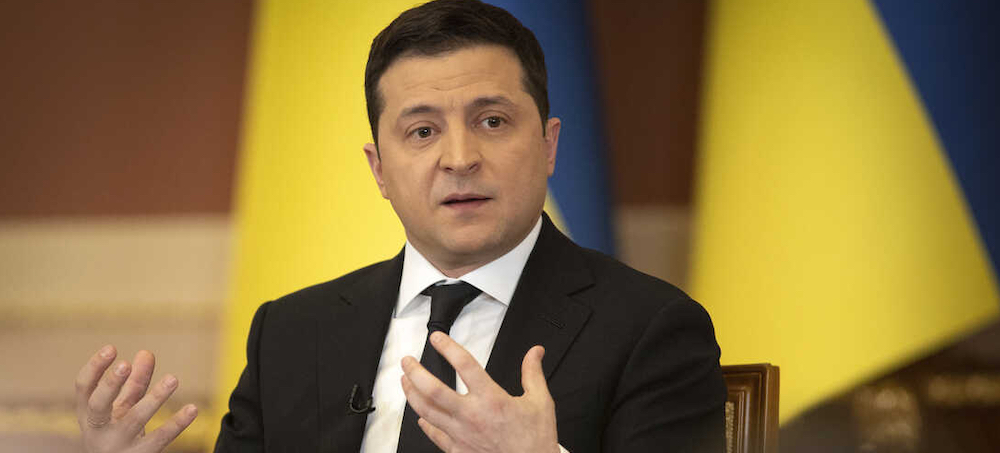 Ukrainian president Volodymyr Zelenskyy. (photo: Ukrainian Presidential Press Office/AP)
Ukrainian president Volodymyr Zelenskyy. (photo: Ukrainian Presidential Press Office/AP)
Ukraine’s military said it has noted withdrawals of some forces around Kyiv and Chernihiv. Pentagon spokesman John Kirby told CNN “we haven’t seen anything to corroborate” reports of Russia pulling back significant forces from around Kyiv. “But what we have seen over the last couple of days is they have stopped trying to advance on Kyiv.”
Rob Lee, a military expert at the U.S.-based Foreign Policy Research Institute, tweeted: “This sounds like more of an acknowledgment of the situation around Kyiv where Russia’s advance has been stalled for weeks and Ukrainian forces have had recent successes. Russia doesn’t have the forces to encircle the city.”
The meeting Tuesday in Istanbul was the first time negotiators from Russia and Ukraine talked face-to-face in two weeks. Earlier talks, held in person in Belarus or by video, made no progress toward ending the more than month-long war that has killed thousands and driven over 10 million Ukrainians from their homes, including almost 4 million who have fled the country.
Fomin suggested there had been progress this time, saying “negotiations on preparing an agreement on Ukraine’s neutrality and non-nuclear status, as well as on giving Ukraine security guarantees, are turning to practical matters.”
Ukraine’s team set out a detailed framework for a peace deal under which the country would remain neutral but its security would be guaranteed by a group of third countries, including the U.S., Britain, France, Turkey, China and Poland, in an arrangement similar to NATO’s "an attack on one is an attack on all” principle.
Ukraine said it would also be willing to hold talks over a 15-year period on the future of the Crimean Peninsula, seized by Russia in 2014.
The Kremlin has demanded among other things that Ukraine drop any hope of joining NATO, which it sees as a threat.
Vladimir Medinskiy, the head of the Russian delegation, said on Russian TV that the Ukrainian proposals are a “step to meet us halfway, a clearly positive fact.” He cautioned that the parties are still far from reaching an agreement, but said: “We know now how to move further toward compromise. We aren’t just marking time in talks.”
In other developments:
— In what appeared to be a coordinated action to tackle Russian espionage, the Netherlands, Belgium, the Czech Republic, Ireland and North Macedonia expelled scores of Russian diplomats.
— The head of the U.N. nuclear watchdog agency arrived in Ukraine to try to ensure the safety of the country’s nuclear facilities. Russian forces have taken control of the decommissioned Chernobyl plant, site in 1986 of the world’s worst nuclear accident, and of the active Zaporizhzhia plant, where a building was damaged in fighting.
— Russia has destroyed more than 60 religious buildings across the country in just over a month of war, with most of the damage concentrated near Kyiv and in the east, Ukraine’s military said.
— Bloomberg said it has suspended operations in Russia and Belarus. Customers in the two countries won’t be able to access any Bloomberg financial products, it said.
— In the room at the Istanbul talks was Roman Abramovich, a longtime Putin ally who has been sanctioned by Britain and the European Union. Kremlin spokesman Dmitry Peskov said the Chelsea soccer team owner has been serving as an unofficial mediator approved by both countries. But mystery about his role has been deepened by news reports that he may have been poisoned during an earlier round of talks.
Over the past several days, Ukrainians forces have mounted counterattacks and reclaimed ground on the outskirts of Kyiv and other areas. They retook Irpin, a key suburb northwest of the capital, Kyiv, Zelenskyy said late Monday. But he warned that Russian troops were regrouping to take the area back.
Ukrainian forces also seized back Trostyanets, south of Sumy in the northeast, after weeks of Russian occupation that left a devastated landscape.
Arriving in the town Monday shortly afterward, The Associated Press saw the bodies of two Russian soldiers in the woods, and Russian tanks sat burned and twisted. A red “Z” marked a Russian truck, its windshield fractured, near stacked boxes of ammunition. Ukrainian forces on top of a tank flashed victory signs. Dazed residents lined up amid charred buildings, seeking aid.
Putin’s ground forces have been thwarted not just by stronger-than-expected Ukrainian resistance, but by what Western officials say are Russian tactical missteps, poor morale, shortages of food, fuel and cold weather gear, and other problems.
Reinforcing what the military said last week, Russian Defense Minister Sergei Shoigu said Tuesday that “liberating Donbas” is now Moscow’s main objective.
While that presents a possible face-saving exit strategy for Putin, it has also raised Ukrainian fears the Kremlin aims to split the country and force it to surrender a swath of its territory.
Special Coverage: Ukraine, A Historic Resistance
READ MORE
Follow us on facebook and twitter!
PO Box 2043 / Citrus Heights, CA 95611
|
|
Live on the homepage now!
Reader Supported News
The House select committee is now investigating whether it has the full record and whether Trump communicated that day through backchannels, phones of aides or personal disposable phones, according to people familiar with the probe.
The lack of an official White House notation of any calls placed to or by Trump for 457 minutes on Jan. 6, 2021 – from 11:17 a.m. to 6:54 p.m. – means the committee has no record of his phone conversations as his supporters descended on the Capitol, battled overwhelmed police and forcibly entered the building, prompting lawmakers and Vice President Mike Pence to flee for safety.
The 11 pages of records, which consist of the president’s official daily diary and the White House switchboard call logs, were turned over by the National Archives earlier this year to the House select committee investigating the Jan. 6 attack.
The records show that Trump was active on the phone for part of the day, documenting conversations that he had with at least eight people in the morning and 11 people that evening. The seven-hour gap also stands in stark contrast to the extensive public reporting about phone conversations he had with allies during the attack, such as a call Trump made to Sen. Mike Lee (R-Utah) — seeking to talk to Sen. Tommy Tuberville (R-Ala.) — and a phone conversation he had with House Minority Leader Kevin McCarthy (R-Calif.).
The House panel is now investigating whether Trump communicated that day through backchannels, phones of aides or personal disposable phones, known as “burner phones,” according to two people with knowledge of the probe, who, like others interviewed for this report, spoke on the condition of anonymity to discuss sensitive information. The committee is also scrutinizing whether it received the full logs from that day.
One lawmaker on the panel said the committee is investigating a “possible coverup” of the official White House record from that day. Another person close to the committee said the large gap in the records is of “intense interest” to some lawmakers on the committee, many of whom have reviewed copies of the documents. Both spoke on the condition of anonymity because they were not authorized to discuss internal committee deliberations.
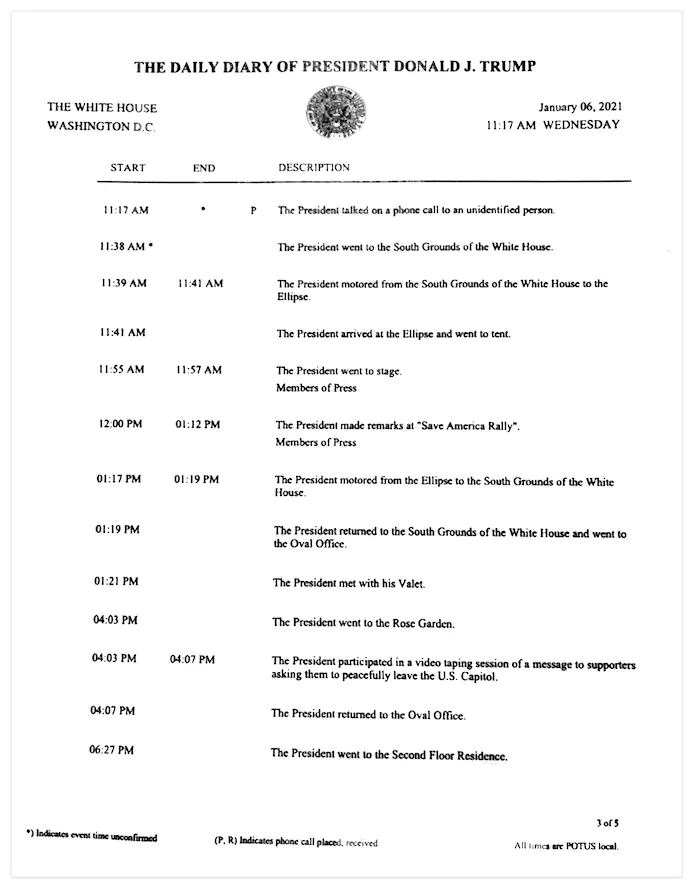
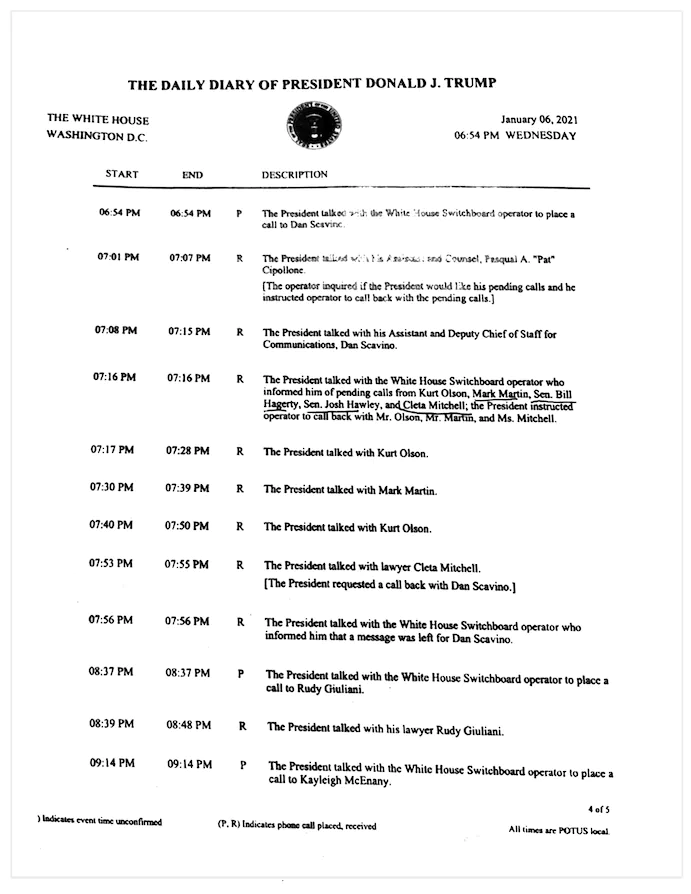
The records show that former White House chief strategist Stephen K. Bannon – who said on his Jan. 5 podcast that “all hell is going to break loose tomorrow” – spoke with Trump twice on Jan. 6. In a call that morning, Bannon urged Trump to continue to pressure Pence to block congressional certification of Joe Biden’s victory in the 2020 presidential election, according to people familiar with the exchange.
Trump was known for using different phones when he was in the White House, according to people familiar with his activities. Occasionally, when he made outbound calls, the number would show up as the White House switchboard’s number, according to a former Trump Cabinet official. Other times, he would call from different numbers – or no number would appear on the recipient’s phone, the official said.
A spokesman for the committee declined to comment.
In a statement Monday night, Trump said, "I have no idea what a burner phone is, to the best of my knowledge I have never even heard the term."
A Trump spokeswoman said that Trump had nothing to do with the records and had assumed any and all of his phone calls were recorded and preserved.
In a recent court filing, the Jan. 6 committee asserted it has “a good-faith basis for concluding that the President and members of his Campaign engaged in a criminal conspiracy to defraud the United States” and obstruct the counting of electoral votes by Congress.
A federal judge said in a ruling Monday that Trump “more likely than not” committed a federal crime in trying to obstruct the congressional count of electoral college votes on Jan. 6. The ruling was regarding emails that conservative lawyer John Eastman, a Trump ally, had resisted turning over to the Jan. 6 committee.
A Trump spokesman called the ruling “absurd and baseless.”
Five of the pages in the White House records obtained by the House committee are titled “THE DAILY DIARY OF PRESIDENT DONALD J. TRUMP” and detail some of Trump’s phone calls and movements on Jan. 6. The remaining six pages are titled “PRESIDENTIAL CALL LOG” and have information provided by the White House switchboard and aides, including phone numbers and notes on the time and duration of some calls.
Those records were given to the committee by the National Archives earlier this year after the Supreme Court rejected Trump’s request for the court to block the committee from obtaining White House documents from Jan. 6.
The Presidential Records Act requires the preservation of memos, letters, notes, emails, faxes and other written communications related to a president’s official duties. The National Archives website states the presidential diary should be a “chronological record of the President’s movements, phone calls, trips” and meetings.
In January, The Post first reported that some of the Trump White House records turned over to the committee were potentially incomplete, including records that had been ripped up and taped back together. The New York Times first reported in February on the committee’s discovery of gaps in the White House phone logs from Jan. 6, but it did not specify when or for how long on that day. CNN first reported that “several hours” in Trump’s records provided to the committee lacked any notation of phone calls.
The documents obtained by the committee show Trump having several previously unreported exchanges on Jan. 6, including brief calls with Bannon and personal lawyer Rudy Giuliani that morning, before Trump had a final call with Pence, in which the vice president told him he was not going to block Congress from formalizing Biden’s victory. The call to the vice president was part of Trump’s attempt to put into motion a plan, advocated by Bannon and outlined in a memo written by conservative lawyer John Eastman, that would enable Trump to hold on to the presidency, as first reported in the book “Peril.”
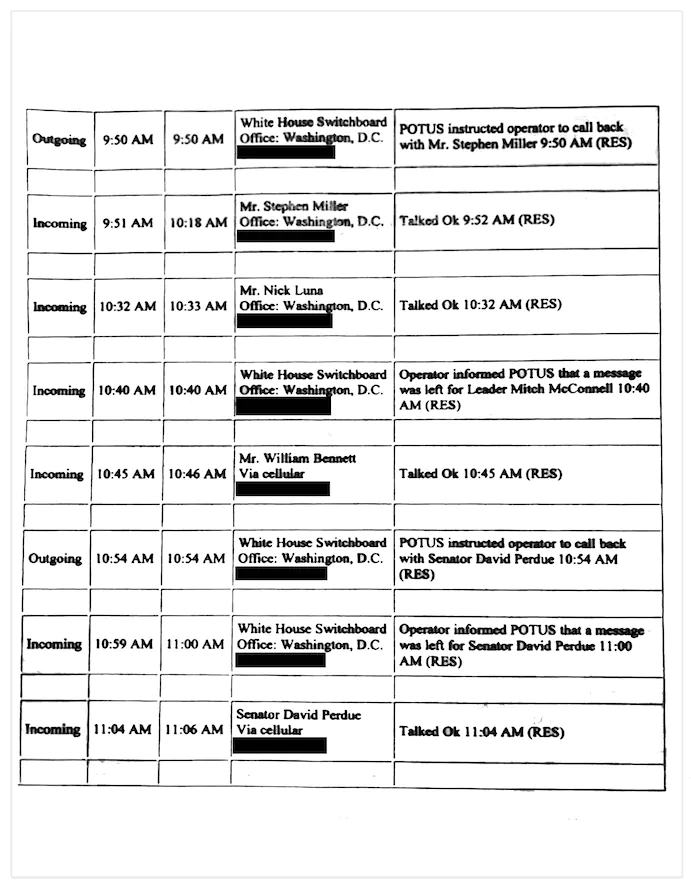
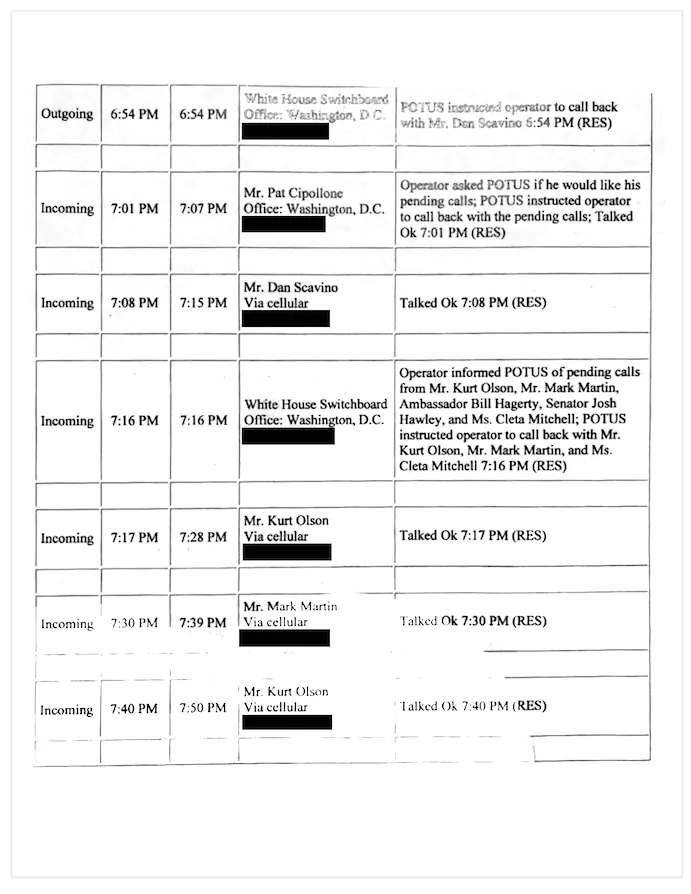
According to White House records, Bannon and Trump spoke at 8:37 a.m. on Jan. 6. Trump spoke with Giuliani around 8:45 a.m. At 8:56 a.m., Trump asked the White House switchboard to return a call from chief of staff Mark Meadows. Then, at 9:02 a.m., Trump asked the operator to place a call to Pence. The operator informed him that a message was left for the vice president.
Bannon’s first Jan. 6 call with Trump lasted for about one minute, according to the documents. During that conversation, Bannon asked Trump whether Pence was coming over for a breakfast meeting, according to two people familiar with the exchange. Bannon hoped Trump could pressure the vice president over breakfast to agree to thwart the congressional certification of Biden’s victory, the people said.
But Trump told Bannon that Pence was not scheduled to come to the White House following a heated meeting Trump and Pence had the previous evening, Jan. 5, in the Oval Office. Bannon quickly pressed Trump that he needed to call Pence and tell him again to hold off on doing anything that would enable certification. Trump agreed, the people said.
According to the White House phone logs, Bannon and Trump spoke again late on Jan. 6 in a call that began at 10:19 p.m. and ended at 10:26 p.m.
Bannon declined to comment through a representative.
Bannon, a central player in a group of Trump allies who met at the Willard hotel near the White House on Jan. 5 to discuss their strategy for Jan. 6, was indicted last year by the Justice Department for refusing to cooperate with the House committee, which is seeking more documents and testimony about his conversations with Trump.
Trump’s final call with Pence is not listed in the call log, even though multiple people close to both men said that call occurred sometime in the late morning before Trump headed to the “Save America” rally on the Ellipse.
During their conversation, Pence told Trump, “When I go to the Capitol, I’ll do my job” and not block Biden’s certification, enraging Trump, according to “Peril.”
Trump said, “Mike you can do this. I’m counting on you to do it. If you don’t do it, I picked the wrong man four years ago,” he added, according to the book. “You’re going to wimp out!”
Pence later released a letter saying he did not, as vice president, have “unilateral authority to decide presidential contests,” and said he would “keep the oath” he made when he was sworn into office.
The White House logs also show that Trump had conversations on Jan. 6 with election lawyers and White House officials, as well as outside allies such as then-senator David Perdue (R-Ga.), conservative commentator William J. Bennett and Fox News host Sean Hannity.
Hannity and Perdue did not respond to requests for comment. Bennett, in a brief interview on Tuesday, said he did not recall the conversation.
According to the documents, Trump spoke with other confidants and political advisers that morning ahead of the rally. At 8:34 a.m., he spoke with Kurt Olsen, who was advising Trump on legal challenges to the election.
Trump then placed calls to Sen. Mitch McConnell (Ky.), the Republican leader, and Sen. Josh Hawley (Mo.), but it is unclear whether he reached them, according to the documents. A McConnell aide said Monday that McConnell declined Trump’s call. Hawley, a Trump ally, was the first senator to declare he would object to the certification, a decision that sparked other GOP senators to say they too would object.
The records show that Trump had a 10-minute call starting at 9:24 a.m. with Rep. Jim Jordan, an Ohio Republican who worked closely with the Trump White House and was a key figure in pushing fellow GOP lawmakers to object to the certification of Biden’s election.
Jordan has declined to cooperate with the House committee. The 10-minute call Trump had with Jordan was first reported by CNN.
Giuliani and Trump spoke on Jan. 6 at 9:41 a.m. for six minutes, and at 8:39 p.m. for nine minutes, according to the White House logs. According to the documents, Giuliani called from different phone numbers.
Giuliani did not respond to a request for comment.
Trump senior adviser Stephen Miller – who told Fox News in December 2020 that an “alternate slate of electors in the contested states is going to vote” – spoke with Trump for 26 minutes on the morning of Jan. 6, the records show. That call started at 9:52 a.m. and ended at 10:18 a.m.
Miller did not respond to a request for comment.
At 11:17 a.m., the White House daily diary states, “The President talked on a phone call to an unidentified person.” That vague call listing, with no notes on duration, is the last official record of a phone conversation that Trump had until the evening of Jan. 6.
The records of Trump’s activity throughout the day are very limited. The daily diary notes that he addressed supporters at a rally at the Ellipse midday and returned to the south grounds of the White House at 1:19 p.m.
“The President met with his Valet,” the records note of Trump’s activity at 1:21 p.m. on Jan. 6.
Trump’s supporters breached the Capitol building shortly after 2 p.m.
The next documented event in the president’s diary comes at 4:03 p.m., when “The President went to the Rose Garden” to record, for four minutes, a video message for the pro-Trump mob that had stormed the Capitol. The video, posted on Twitter at 4:17 p.m., begins with Trump falsely claiming the 2020 election was stolen, then asks the rioters to “go home.” He added, “We love you. You’re very special.”
“The President returned to the Oval Office” at 4:07 p.m., the records state. The next listed action comes at 6:27 p.m.: “The President went to the Second Floor Residence.”
According to the logs, Trump made his first phone call in more than seven hours at 6:54 p.m., when he instructed the operator to call aide Daniel Scavino Jr.
At 7:01 p.m., the records show, Trump spoke with Pat Cipollone, the White House counsel, for six minutes, and later spoke with press secretary Kayleigh McEnany.
At 9:23 p.m., Trump spoke with political adviser Jason Miller for 18 minutes. Miller has engaged with the committee and sat for a deposition, parts of which were excerpted in the committee’s filing alleging a criminal conspiracy was advanced by Trump and his allies.
Scavino could not be reached for comment. Cipollone and McEnany did not respond to requests for comment. Miller did not respond to a request for comment.
That night, Trump also spoke with lawyers supporting his election fight, such as former North Carolina Supreme Court chief justice Mark Martin and Cleta Mitchell, a veteran conservative Washington attorney who worked closely with Trump on contesting Biden’s victory in Georgia, according to the records.
His final listed call came at 11:23 p.m. and lasted 17 minutes. It was with John McEntee, then the director of presidential personnel.
Earlier this year, the Supreme Court, in an unsigned order, rejected Trump’s request to block the release of some White House records, which have been stored by the National Archives, to the committee. The Supreme Court’s order in January included a dissent from Justice Clarence Thomas.
Last week, The Post and CBS News reported the committee has obtained 29 text messages from the post-election period between Meadows and Virginia “Ginni” Thomas, Justice Thomas’s wife and a longtime conservative activist.
The messages, which do not directly reference Justice Thomas or the Supreme Court, show how Ginni Thomas used her access to Trump’s inner circle to promote and seek to guide the president’s strategy to overturn the election results – and how receptive and grateful Meadows said he was to receive her advice. Justice Thomas and Ginni Thomas have not responded to multiple requests for comment. She has long maintained that there is no conflict of interest between her activism and her husband’s work.
Special Coverage: Ukraine, A Historic Resistance
READ MORE
Follow us on facebook and twitter!
PO Box 2043 / Citrus Heights, CA 95611